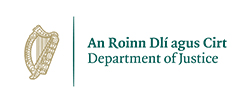|
|
Cashel Garda Station are to host a Coffee Morning, on Saturday March 8th next, 2025 in conjunction with Women’s aid National day.
Women’s Aid is a national feminist organisation working to prevent and address the prevalence of domestic abuse within Irish society; how it impacts especially women during pregnancy and how employers can lead in addressing domestic abuse within the workplace.
The coffee morning will run from 11:00am until 1:00pm and the public are invited to pop in for something nice, to help support a worthy cause or even for a bit of advice or information.
- Gambling Regulatory Authority of Ireland established effective from 5 March 2025.
- Seven members to be appointed to independent authority, including chairperson Mr Paul Quinn.
An order for parts of the Gambling Regulation Act 2024, enabling the Authority to become operational to establish Údarás Rialála Cearrbhachais na hÉireann, the Gambling Regulatory Authority of Ireland, on a statutory basis, will now commence.
Seven members of this new, independent Authority, will be appointed and commence their roles with effect from tomorrow, March 5th, 2025. They will be the members of the Authority which will be responsible for regulating and licencing all gambling providers in the State and which will have wide ranging powers to regulate both in-person and online gambling, gaming and most lotteries.
Mr. Paul Quinn has been appointed as chair of the Authority and the other newly appointed members are named as follows:-
Ms. Celine Craig.
Ms. Marion Kelly.
Ms. Rita Purcell.
Mr. David Hickson.
Mr. Michael McGrath.
Dr. Colin O’Driscoll, (Ordinary Member).
It has been confirmed that chartered deportation flights have recommenced in order to enforce Ireland’s immigration laws. Yesterday, Thursday, 27th February, a chartered flight to Georgia, removed persons who were subject to Deportation Orders, from the Irish State.
This is the first operation conducted under a contract signed by the State, last November, for the provision of charter aircraft for these purposes. Further operations will be conducted as the year progresses.
Charter flights provide an alternative to commercial flights and can be more appropriate in circumstances when a group of individuals are being removed to the same destination.
A contract was signed in November last year for the provision of charter aircraft for deportation operation purposes. Access to these services has significantly increased the capacity of An Garda Síochána, to effect removals.
Enforced removals are carried out as a measure of last resort when the person concerned has not removed themselves from the State or availed of assisted voluntary return measures.
In this instance, the people concerned were Georgian nationals and the flight left Dublin Airport on Thursday night before landing in Tbilisi, Georgia, on Friday morning.
The returnees were accompanied on the flight by Garda personnel, medical staff, an interpreter and a human rights observer.
Gardaí are understood to be investigating several complaints of alleged sexual abuse at St Anne’s special school, latter located on the grounds of Sean Ross Abbey, in Roscrea, Co. Tipperary.
The abuse is understood to involve up to nine studets and the alledged abuses date back to the years 1995 and 1996.
We also understand that a Garda investigation was launched from Templemore Garda Station, in October 1996 into the incidents, but same allegations received no public attention during that period of time.
Currently Gardaí state that they are continuing an ongoing criminal investigation into these alleged assaults at this Tipperary facility, but are not in a position to comment any further. However, they confirm that they are not aware of any political interference with this criminal investigation, which is also being alleged.
The abuse is understood to have come to the attention of parents, through students in attendance; the former who subsequently contacted Gardaí.
To current date, no criminal proceedings have been brought by the State, despite the formal complaints made to Gardaí, however a file is understood to have been sent to the Director of Public Prosecutions (DPP).
Launch Of New Domestic, Sexual and Gender-Based Violence Awareness Raising Campaign.
- National campaign that places survivors and victims centre stage to be launched.
- First awareness-raising campaign from Cuan, the DSGBV Agency, aiming to empower people to tell their stories.
A powerful new campaign to raise awareness of domestic and sexual violence, focusing on the importance of victims and survivors telling their story, is being launched today.
‘Hardest Stories’ is the first national awareness-raising campaign by Cuan, the Domestic, Sexual and Gender-Based Violence (DSGBV) Agency.
The campaign, with a tag-line of ‘The stories that are hardest to tell need to be told’, aims to shine a light on particular stories of violence, while acknowledging that too many of these stories exist, and to empower people to tell their own personal story.
Both domestic violence and sexual violence are crimes that have traditionally been under-reported, and significant work is being done to increase reporting, including through awareness campaigns.
The campaign is centred on two television adverts, both of which provide a snapshot into what the survivor remembers of the abuse that they themselves suffered; how they felt, and how they continue to feel.
Further assets, which will run across radio and digital channels, will feature more stories from men, women, and the LGBT+ community. They are stories of harassment, abuse, rape and stories of violence.
While the stories are difficult to tell and to hear; the intention behind the campaign is to encourage and empower people to come forward.
In addition to raising the importance of these stories, the campaign calls on the public to take an active role in tackling DSGBV and provides information on how to support someone who is a victim or survivor; on what signs to look out for, and on how they can use their voice to make change happen.
Dr. Stephanie O’Keeffe, (CEO of Cuan), said, “Centring the experience of victims and survivors of DSGBV is at the heart the values we bring to our work in Cuan. This is why we felt that our Agency’s first public awareness campaign should bring this experience centre-stage. The overarching message of the campaign is that Domestic, Sexual and Gender-Based Violence is prevalent in Irish society, however it is often hidden or ignored. With this campaign we hope to raise awareness of domestic and sexual violence within our society, encourage victims and survivors not to suffer in silence and to recognise that by telling their story they can reclaim their power.”
The campaign will run across TV; national and local radio; in press; digital and social media; in cinemas; on billboards and digital screens, throughout Ireland from Thursday February 27th.
The ‘Hardest Stories’ campaign website can be found LINKED HERE
NOTE: Details of Local Support Services available in Co. Tipperary can be found HERE.
Cuan Saor Refuge Locations In Tipperary:
Clonmel: Helpline Number 1800 57 67 57 or Email support@cuansaor.org.
Roscrea: Helpline Number 0505 23999 or Email ascend@ntdc.ie.
Services Provided: Include Refuge Accomodation, Helpline, Support and Information, One to One Support, Counselling, Outreach, Court Accompaniment, Training and Awareness-raising, Child and Family Support.
|
Support Us Help keep Thurles.info online by donating below. Thank you.
Total Donated 2025: €130.00
Thank You!
Daily Thurles Mass Livestream
|





Recent Comments